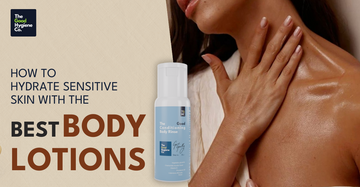Sensitive skin is more than just a label—it’s a condition that needs thoughtful care, daily attention, and scientifically supported ingredients. When your skin reacts with redness, tightness, or dryness after cleansing or exposure to weather, it may be signaling a weakened skin barrier.
In this blog, we’ll explore why hydration is critical for sensitive skin, how a well-formulated body lotion for sensitive skin helps, and why ingredients like hibiscus, ucuuba butter, and niacinamide are excellent choices.
Why Does Sensitive Skin Dry Out So Easily?
Sensitive skin is often characterized by a compromised skin barrier—specifically, a damaged stratum corneum, which is the outermost layer of your skin. This leads to increased transepidermal water loss (TEWL), making skin prone to dryness, inflammation, and irritation. Skin with high TEWL shows reduced water content in the epidermis, triggering a cycle of dehydration and inflammation. Exposure to pollution is reported to cause increases in TEWL, likely through free radical damage. (1)
Additionally, individuals with sensitive skin often have heightened inflammatory responses to environmental triggers like pollution, UV exposure, or harsh cleansers. The result? A persistent feeling of tightness, flakiness, and discomfort—even after using regular moisturizers.
The Role of Body Lotion: Not Just Moisture, But Protection
A well-formulated body lotion for sensitive skin serves two critical functions for sensitive skin:
- Replenishes hydration using humectants (water-attracting ingredients).
- Strengthens and seals the barrier using emollients and occlusives.
- Here’s how each class of ingredient works:
- Humectants (like glycerin or niacinamide) draw moisture into the upper layers of the skin.
- Emollients (like squalane or avocado oil) fill in gaps between skin cells, smoothing texture.
- Occlusives (like plant butters and fatty acids) create a seal to prevent water from escaping.
Research states that moisturizers combining these three categories significantly reduce TEWL and improve barrier recovery in people with dry, sensitive, or atopic skin.(2)
What Makes a Body Lotion Suitable for Sensitive Skin?
Not all body lotions are created equal. In a body lotion for sensitive skin, the formulation must be:
- Free from artificial fragrance and harsh preservatives
- pH-balanced to the skin’s natural range (~5.5)
- Enriched with anti-inflammatory and barrier-supportive ingredients
- Lightweight and fast-absorbing, to reduce risk of occlusion and clogging
Research suggests that formulations containing botanical extracts with anti-inflammatory, antioxidant, and barrier-repair benefits can be particularly effective for sensitive skin types.(3)
Spotlight on Ingredients: What Science Says
Let’s explore some scientifically backed ingredients that offer targeted relief and hydration for sensitive skin:
Hibiscus Glycerite: A Gentle Botanical for Radiant, Calm Skin
Hibiscus (Hibiscus sabdariffa) is rich in flavonoids, anthocyanins, and natural alpha-hydroxy acids (AHAs).
According to studies , hibiscus extract shows anti-inflammatory and antioxidant effects on keratinocytes and fibroblasts—two key skin cell types . These properties are especially helpful in calming red, inflamed, or irritated skin.
Additionally, the AHAs in hibiscus promote gentle exfoliation, improving skin tone and texture without stripping natural oils. This makes it ideal for brightening dry, dull areas of sensitive body skin.
Clinical Benefits:
- Reduces inflammation
- Boosts collagen expression
- Gently exfoliates
- Supports a more even skin tone
Ucuuba Butter: Deep Nourishment Without the Grease
Extracted from the seeds of the Virola surinamensis tree, ucuuba butter is rich in lauric, myristic, and oleic acids. These fatty acids offer excellent emollient and occlusive properties, helping to:
- Lock in moisture
- Repair the skin lipid barrier
- Reduce flakiness and dryness
Plant-based butters with high fatty acid content can significantly improve skin hydration and texture, especially when used in body lotions for dry skin.
Niacinamide (Vitamin B3): The Barrier Booster
Niacinamide is one of the most well-documented ingredients in skincare, known for its ability to:
- Reduce TEWL
- Strengthen the skin barrier
- Calm redness and inflammation
- Brighten hyperpigmentation
Niacinamide significantly improves barrier function and moisture retention in individuals with atopic dermatitis, acne, and rosacea—all conditions tied to skin sensitivity.
Plant-Based Squalane: Lightweight Yet Powerful
Derived from sugarcane or olives, squalane is a biocompatible emollient that mimics human sebum. Unlike mineral oils, it:
- Absorbs quickly without leaving a greasy film
- Enhances suppleness and elasticity
- Soothes dry, reactive patches
Squalane’s molecular structure allows it to penetrate deeper layers of the stratum corneum, improving skin texture over time.
Calendula & Chamomile Hydrosol: Botanical Calm for Flare-Ups
Calendula officinalis and Chamomilla recutita are long-celebrated in herbal medicine. When used in flower water or extract form, they:
- Reduce itching and redness
- Support skin repair
- Provide antimicrobial protection
How to Apply Body Lotion Effectively
Hydrating sensitive skin isn’t just about the product—it’s about the routine.
- Apply immediately after bathing: Your skin retains water best when it’s still slightly damp. Lock in that moisture with a gentle layer of body lotion for sensitive skin within 3–5 minutes after a shower.
- Use upward, gentle strokes: Avoid rubbing or friction. Let the product absorb naturally.
- Pay attention to problem areas: Knees, elbows, and lower legs often lose moisture faster. Reapply as needed throughout the day.
- Consistency matters: Dermatological improvements in barrier function occur over weeks, not days. Daily application is essential for long-term resilience.
Conclusion
Hydrating sensitive skin requires more than trial and error—it demands understanding your skin’s biology and choosing formulations backed by research. The right body lotion for sensitive skin will:
- Restore the skin barrier
- Retain long-lasting moisture
- Calm irritation
- Support skin healing and radiance
Ingredients like hibiscus, niacinamide, squalane, and botanical flower waters offer a science-backed foundation for soothing hydration. If you're dealing with chronic dryness or frequent skin reactions, upgrading your body lotion isn't just about comfort—it’s about protecting your skin’s future.
References:
1. Transepidermal water loss (TEWL): Environment and pollution—A systematic review - 2022 Feb - https://pmc.ncbi.nlm.nih.gov/articles/PMC9168018/
2. The Role of Moisturizers in Addressing Various Kinds of Dermatitis: A Review - 2017 Dec - https://pmc.ncbi.nlm.nih.gov/articles/PMC5849435/
3. Anti-Inflammatory and Skin Barrier Repair Effects of Topical Application of Some Plant Oils - 2017 Dec - https://pmc.ncbi.nlm.nih.gov/articles/PMC5796020/






